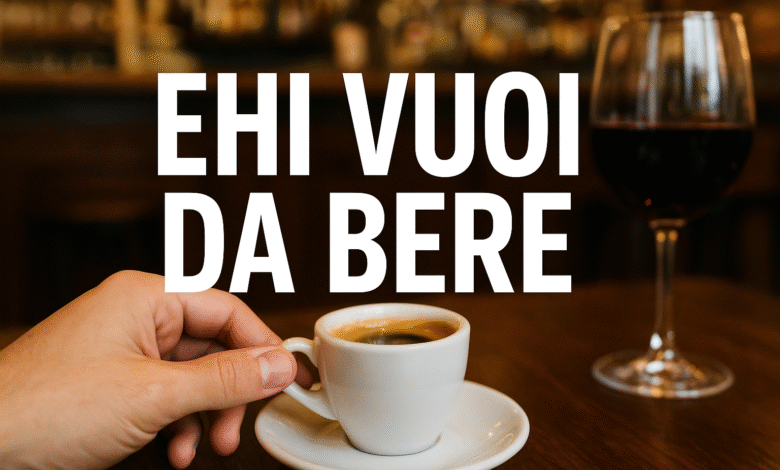Ehi Vuoi Da Bere: Exploring the Italian Phrase, Its Meaning, and Cultural Significance

Languages are more than just tools for communication; they are windows into culture, traditions, and values. Italian, a language loved worldwide for its beauty and musicality, is full of expressions that reveal the warmth of its people. One such phrase is “ehi vuoi da bere”, which literally translates to “hey, do you want something to drink?”. At first glance, it may seem like a simple offer, but in Italian culture, this expression carries layers of meaning that reflect hospitality, friendship, and social connection.
In this article, we’ll take a deep dive into the phrase “ehi vuoi da bere”. We’ll explore its literal meaning, how it is used in everyday life, its cultural importance, examples in different contexts, and why it’s a great phrase for anyone learning Italian.
The Literal Meaning of “Ehi Vuoi Da Bere”
Breaking the phrase into parts helps us understand its direct translation:
-
Ehi = Hey (an informal way of grabbing attention).
-
Vuoi = Do you want.
-
Da bere = To drink, or something to drink.
So together, “ehi vuoi da bere” is simply: “Hey, do you want something to drink?”.
While straightforward, its true significance depends on context, tone, and setting. It can be a friendly offer, a gesture of care, or even a way of starting a conversation.
Everyday Situations Where the Phrase is Used
Italian life is rich with moments where food and drink bring people together. That’s why you’ll hear “ehi vuoi da bere” in many different scenarios:
At Home
When you visit an Italian household, one of the first things you’ll be offered is a drink. Whether it’s a glass of water, juice, wine, or coffee, the host is quick to say “ehi vuoi da bere”. This is not just politeness—it’s a symbol of hospitality and care.
At a Bar or Café
In Italy, cafés (or bar in Italian) are social hubs. Friends may say “ehi vuoi da bere” before ordering a round of coffee or aperitifs. It’s a casual way of making sure everyone is included.
During a Party or Gathering
Social gatherings in Italy revolve around food and drinks. A host might walk around offering drinks with “ehi vuoi da bere” to keep the mood lively and welcoming.
Among Friends
Sometimes, it’s not about formal hospitality but simple camaraderie. Among friends, “ehi vuoi da bere” can be a lighthearted offer, perhaps followed by laughter or jokes.
Cultural Significance of Offering a Drink
To understand “ehi vuoi da bere”, you must look beyond the literal meaning. Italians see offering a drink as an extension of warmth, friendship, and respect.
Hospitality is Sacred
In Italian culture, hosting guests is taken seriously. A host ensures that visitors feel comfortable and cared for, and the first step is often offering them something to drink. Saying “ehi vuoi da bere” is therefore much more than a practical question—it’s a ritual of inclusion.
Drinks as Social Connectors
Whether it’s an espresso in the morning, wine at dinner, or an aperitivo in the evening, drinks play a central role in Italian life. Offering someone a drink is like inviting them into a shared experience.
Building Relationships
A simple “ehi vuoi da bere” can break the ice in new friendships, strengthen bonds among colleagues, or deepen ties within a family. It reflects the Italian value of relationships over formality.
Variations of the Phrase
Like any language, Italian has different ways to express the same idea. Depending on the setting, you might hear alternatives to “ehi vuoi da bere”:
-
Vuoi qualcosa da bere? – Do you want something to drink? (more neutral)
-
Ti va da bere? – Do you feel like having something to drink? (more casual)
-
Posso offrirti da bere? – Can I offer you a drink? (more formal or polite)
Each variation carries its own tone, but the essence remains the same: hospitality and care.
How to Respond to “Ehi Vuoi Da Bere”
If someone asks you “ehi vuoi da bere”, your response depends on whether you want to accept or decline.
-
Yes, please: “Sì, grazie.” (Yes, thank you.)
-
No, thank you: “No, grazie.” (No, thank you.)
-
Maybe later: “Forse più tardi.” (Maybe later.)
-
Sure, what do you have?: “Certo, cosa hai?” (Sure, what do you have?)
Politeness is always appreciated in Italy, so don’t forget the “grazie” (thank you).
Why This Phrase Matters for Language Learners
If you’re studying Italian, learning phrases like “ehi vuoi da bere” is incredibly valuable. Here’s why:
It’s Practical
This is a phrase you’ll actually use, whether at a café, restaurant, or someone’s home.
It’s Easy to Remember
Short and simple, it’s perfect for beginners while still being useful for advanced learners.
It Teaches Culture
Language learning isn’t only about grammar and vocabulary—it’s also about understanding how people interact. This phrase embodies Italian warmth and friendliness.
It Boosts Confidence
Using expressions like “ehi vuoi da bere” in real-life situations helps learners feel more natural and confident in conversations.
Drinks Commonly Associated with the Phrase
When Italians say “ehi vuoi da bere”, the drink could be almost anything. Some common options include:
-
Water – Always offered, especially with meals.
-
Coffee (Caffè or Cappuccino) – A daily ritual in Italy.
-
Wine – A staple of Italian dining.
-
Aperitivo Drinks – Like Spritz or Negroni during the evening social hour.
-
Juice or Soft Drinks – Especially for children or casual settings.
The choice of drink often depends on the time of day, the relationship between people, and the setting.
Beyond the Drink: A Symbol of Italian Spirit
Ultimately, “ehi vuoi da bere” represents more than just an offer of refreshment. It reflects the Italian approach to life: valuing connection, slowing down to share a moment, and showing care through small gestures.
Italians believe that life’s joys are found in simple acts—sharing food, offering drinks, and spending time together. This phrase is a perfect example of how everyday language reflects deeper cultural values.
Read also: The Rise of Suckernpunch: From Slang to Digital Culture
Conclusion
The phrase “ehi vuoi da bere” might seem ordinary at first, but it’s actually a cultural gem. It’s a reflection of Italian hospitality, a gateway to social interaction, and a small yet powerful example of how language and culture intertwine.
For learners of Italian, understanding and using “ehi vuoi da bere” is more than just mastering a phrase—it’s stepping into the rhythm of Italian life, where offering a drink is the beginning of friendship, conversation, and connection.
So the next time you find yourself in Italy, or simply practicing the language with friends, remember this simple phrase. A warm smile and “ehi vuoi da bere” might just open the door to an unforgettable moment of connection.



